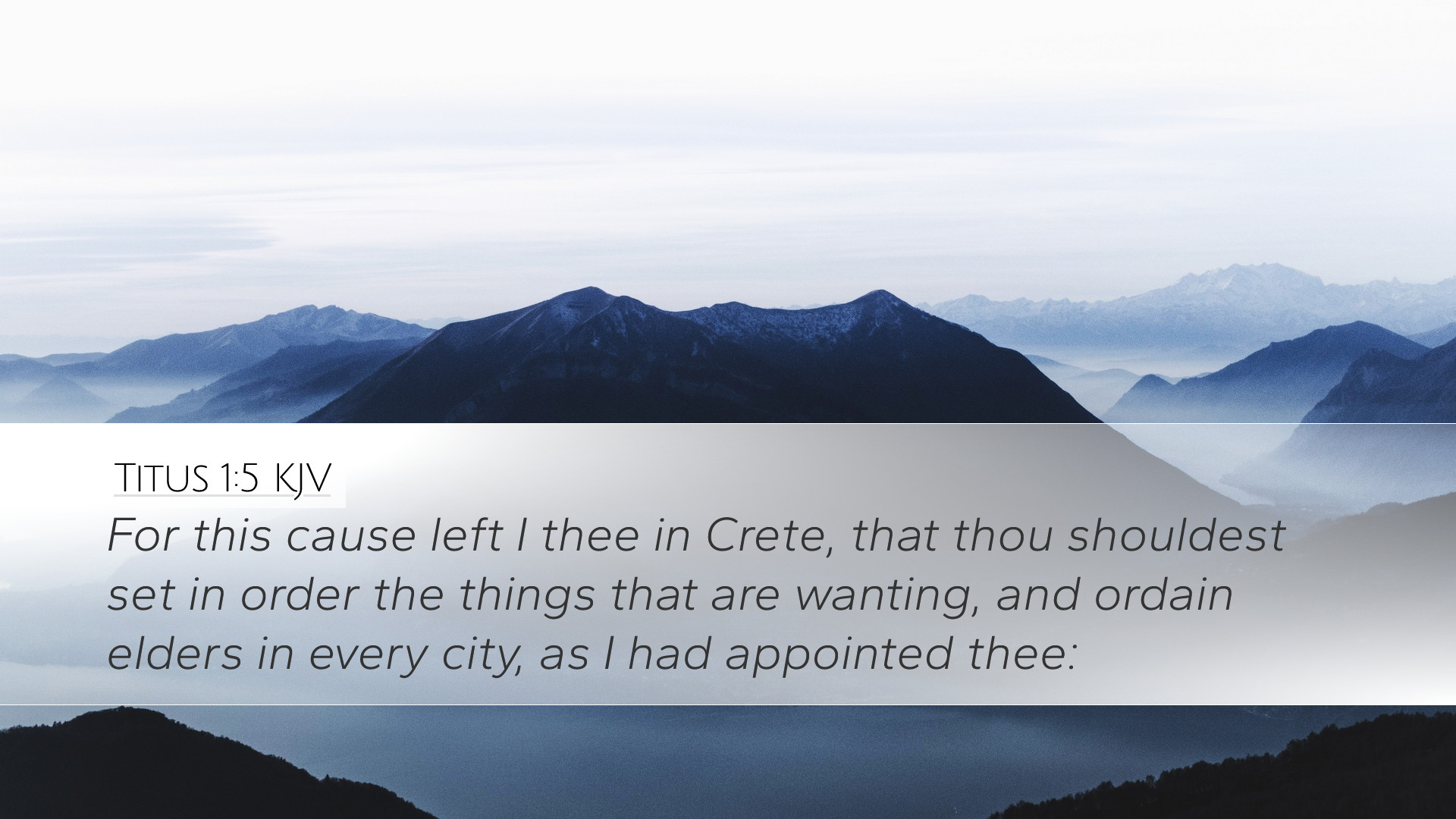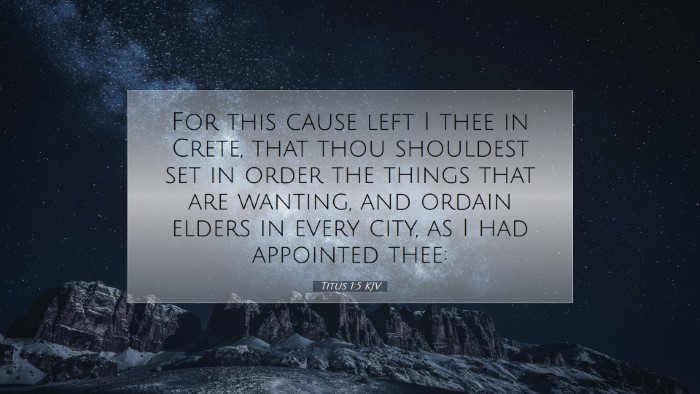Old Testament
Genesis Exodus Leviticus Numbers Deuteronomy Joshua Judges Ruth 1 Samuel 2 Samuel 1 Kings 2 Kings 1 Chronicles 2 Chronicles Ezra Nehemiah Esther Job Psalms Proverbs Ecclesiastes Song of Solomon Isaiah Jeremiah Lamentations Ezekiel Daniel Hosea Joel Amos Obadiah Jonah Micah Nahum Habakkuk Zephaniah Haggai Zechariah MalachiTitus 1:5
Titus 1:5 KJV
For this cause left I thee in Crete, that thou shouldest set in order the things that are wanting, and ordain elders in every city, as I had appointed thee:
Titus 1:5 Bible Commentary
Commentary on Titus 1:5
Bible Verse: "For this cause left I thee in Crete, that thou shouldest set in order the things that are wanting, and ordain elders in every city, as I had appointed thee."
Introduction
The Apostle Paul, in his epistle to Titus, addresses significant issues regarding church governance and the necessity of appointing elders. Titus' mission in Crete signifies a foundational stage in establishing the Christian church. This verse encapsulates the reason for Titus’ presence in Crete, underscoring the importance of church order and leadership.
Purpose of Titus' Mission
Matthew Henry posits that Paul’s directive to Titus indicates an urgent necessity to "set in order the things that are wanting." The church in Crete was in a state of disarray, lacking proper leadership and doctrinal clarity. Paul emphasizes the call for strong, spiritual oversight to ensure that Christian teachings were preserved and propagated.
Adam Clarke further elaborates on the context by noting that the Cretans had a reputation for being deceitful and lazy, necessitating a robust leadership framework. This paints a picture of a challenging environment where sound doctrine needed to counter cultural norms.
Setting in Order
The phrase “set in order the things that are wanting” illustrates the urgency of establishing a well-ordered church. According to Albert Barnes, this implies rectifying deficiencies within the church. These deficiencies could encompass a lack of leadership, sound doctrine, and moral instruction.
This setting in order is not merely administrative but deeply spiritual. It involves ensuring that the church functions according to the teachings of Christ and the apostolic doctrine. The role of the elder becomes crucial as these leaders were to guide the community toward holistic maturity in the faith.
Ordaining Elders
The instruction to "ordain elders in every city" reflects Paul's understanding of the necessity of local church leadership. Matthew Henry emphasizes that elders are vital for maintaining order and purity within the church. Their appointment was not to consolidate power but to serve the body of Christ effectively.
Adam Clarke addresses the characteristics of suitable elders, indicating that they must possess proven faithfulness and exemplary conduct. This mirrors the requirements detailed in later verses (Titus 1:6-9) regarding the personal qualities expected from church leaders, including integrity, hospitality, and soundness in doctrine.
Albert Barnes notes that the appointment of elders is indicative of a broader principle in establishing church governance, which aims to protect the church from false teachings and moral degradation. By raising leaders who are doctrinally sound, the church community is better equipped to navigate challenges.
Theological Implications
This verse highlights vital theological principles concerning church authority and governance. The establishment of church leadership is not merely a structural necessity; it is a divine mandate for fostering spiritual growth among believers.
Matthew Henry draws attention to the divine origin of church authority, suggesting that God Himself ordains leaders. This notion reinforces the seriousness of appointing individuals who are spiritually mature and capable of shepherding the flock entrusted to them.
The emphasis on collective governance through multiple elders (in “every city”) also reveals a God-ordained structure that contrasts with individualistic or hierarchical forms of church governance. Albert Barnes highlights this plurality of elders as a safeguard against potential abuses of power.
Application for the Modern Church
The teachings from Titus 1:5 continue to resonate strongly in today’s church context. Effective church governance remains a paramount concern, fostering healthy spiritual environments where believers can grow and thrive.
Adam Clarke encourages contemporary leaders to reflect on the qualities suitable for church leadership. The call to lead must be accompanied by a commitment to integrity and sound doctrine in a world rife with conflicting ideologies.
Furthermore, Matthew Henry challenges modern congregations to actively participate in the process of selecting and supporting godly leaders. The church body collectively shares the responsibility of discerning spiritual maturity in candidates for leadership.
Conclusion
In conclusion, Titus 1:5 serves as a profound reminder of the essential role of leaders in the church and the ordering of church life according to biblical standards. The insights from distinguished commentators such as Matthew Henry, Albert Barnes, and Adam Clarke underscore the theological significance of this verse and its implications for both historical and contemporary church settings.
The imperative to establish elders in every city speaks to God’s desire for order and integrity within His church, a principle that remains relevant as we seek to fulfill the Great Commission in a diverse and often challenging world.


